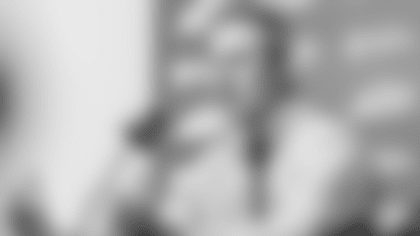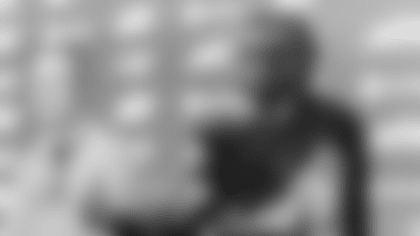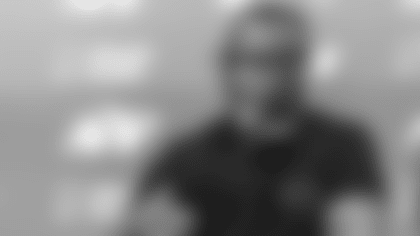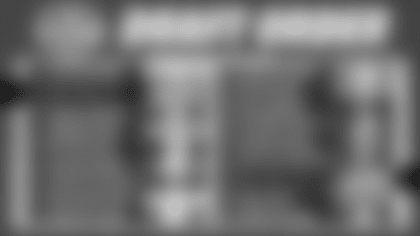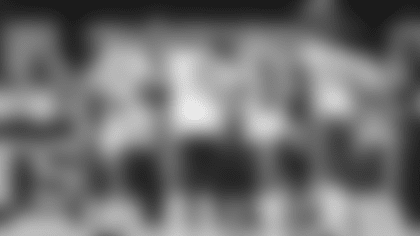The Jets quietly made a pivotal move in February when they hired Bill Hughan as their new head strength and conditioning coach. After a pair of stints as an NFL assistant with Oakland (2004–07) and Atlanta ('08-11), Hughan is settling in well as the No. 1 man.
"It's been an easy transition in terms of the people," Hughan said from his first-floor office at the Atlantic Health Jets Training Center. "Everyone in the organization has been a great help to me getting settled. What really has been big is my staff. Having [assistant strength and conditioning coach] Bryan Dermody, with the knowledge he brings to the table as well as being here last year, is huge and our philosophies are aligned very closely.
"Also [assistant strength and conditioning coach] Kevin Stewart has been a great addition to our staff. He and Bryan will be invaluable as we move forward with our program. The three of us spend a lot of time on the floor going through our philosophy and how we're going to implement everything — from programming to how to coach and teach every aspect of the program. Inside and out, from corrective exercises to strength training, to speed and agility, to power, to recovery, restoration and nutrition and on down the list."
An apprentice under Falcons director of athletic performance Jeff Fish for the past decade, Hughan soaked in the knowledge while at Missouri and both of his NFL stops.
"I learned from him literally every day for 10 years," said Hughan. "I didn't realize how well-prepared I was for my interview when I came up here. Jeff is a great teacher and he has helped me immensely."
Art of Coaching, Science of Training
Hughan views the strength coaches' positions as multidimensional.
"As a strength coach there is the art of coaching and there is the science of training. Unless you excel in both of those areas, you're not going to be a successful strength coach," he said. "A lot of that idea is being adaptable and being able to know your audience. Know your players and know what they want, but also know what they need as well."
What can the Jets expect from their new strength coach?
"Enthusiasm, dedication, detail and communication. I have to make sure people see the passion I have as a coach and make that come to life on a daily basis," Hughan said. "That creates an environment that breeds enthusiasm for the players, so everyone enjoys what they're doing while working to get better. The atmosphere that we want to create has enthusiasm mixed with intensity. When we combine this atmosphere with intangibles like accountability, coachability and a strong work ethic, then we gain a competitive edge."
Every player who reaches the professional ranks is competitive, but each is motivated by different styles.
"The key will be getting to know the players as individuals and showing them the connection between their training and performance," Hughan explained. "You also have to consider that people are unique and are motivated through various techniques. There is a balance there and certainly personality is important because you have to know each player and the ins and outs of what's going to get each player to maximize his effort, and in turn his development. Some players will respond well to really hard coaching and some players don't want that at all. Everyone responds differently — myself included."
Three elements will be the foundation of Hughan's leadership.
"We will ask that each player is responsible and accountable," he said. "We want them to have an 'EA Factor,' and that's possessing great effort along with having a positive attitude. Lastly we want them to focus on daily improvement and getting better at something every day. All of these qualities are within each player's control and set the stage for their physical development."
Functional Movement
When the Jets arrive for formal training in Florham Park, N.J., they'll be greeted with an assessment. The Functional Movement Screen (FMS) will provide Hughan a starting point for each individual.
"The first thing we're going to do is assess every player to find out what he needs. The FMS will show us each player's restrictions and asymmetries. We need to address any right and left differences in any movement patterns as soon as possible." Hughan said. "The more restrictions you have, the harder you will have to work to improve your movement potential."
Hughan and his staff will attempt to eliminate each player's restrictions as they tailor the respective programs to each individual's needs. Once a player displays competency and proficiency in each area, he will progress accordingly.
The approach is simple. Hughan wants to do whatever he can to give his players an advantage on the football field.
"It's about functional training," he said. "The bottom line is if it doesn't help you on the field, then it doesn't help you. Everything we are doing is based on increasing movement efficiency. We are movement based athletes, so we're not just about lifting weight. It's about being able to function as an athlete, as a football player, and making you strong, mobile and stable in relation to the position you play."
Means to an End
Before earning his graduate degree in applied physiology at nearby Columbia University, Hughan attended Springfield College and played hockey while also obtaining his bachelor's degree in exercise science.
"I am from Connecticut and I grew up as a hockey player." he said. "I was more of a hard-nose, grinder type of player. I had to work for everything, but I always did. I wasn't an exceptional athlete by any means but someone who had to work for everything."
When he wasn't digging the puck out of the corner or delivering a hip check along the boards, Hughan worked diligently off the ice. He was intrigued by the process of how certain methods and techniques were going to make him better.
"I was someone who always wanted to know why, and I feel like it is important for players to know why we are training a certain way," he said. "What's the big picture? What's the vision? Where is this going? Where is this taking us? That's where I was, so I can understand why players want to know what they're doing and why they are doing it."
So Hughan will encourage questions from the Jets. He believes that once they see the direction they're headed, it will be easy to buy in.
"As a player you want to do something that's helping you. If you don't ask questions and aren't sure why you are doing the specific training methods, you'll be less apt to buy in," he said. "From a strength coach's perspective, you want to earn the respect and the credibility of the players and you only do that from being sound and consistent. It's not something that can be a one-day thing. It's earned over time. I think that trust and communication is important and it works both ways."
The start to everything for the Jets will begin in Hughan's weightroom. He has heard plenty of positives about the players' work habits and he is eager for movement to begin.
"Our training is a means to an end. But the end isn't in the weightroom because that happens on the practice field and ultimately on Sunday afternoons," he said. "In here, you're preparing for what will happen down the road — whether it is an offseason and you're preparing for the demands of training camp or inseason during the week and your preparation helps set the table for success on game day."



